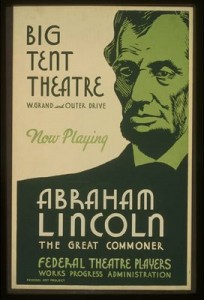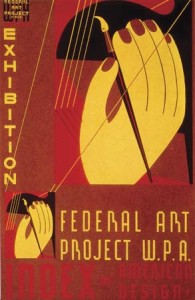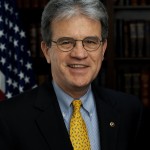
Art Scatter’s had a case of the sniffles the past few days and hasn’t been keeping up with reporting duties. Fortunately, our friends at Culture Shock have been doing a bang-up job.
First, on Friday, Culture Shock’s Culture Jock came across with the news that the Coburn Amendment, which would have denied any money for arts and cultural purposes in the economic stimulus bill, had been killed by the House-Senate conference committee, and that a fresh $50 million for the National Endowment for the Arts — which had been part of the House version but absent from the Senate stimulus bill — had made it into the final stimulus package to be signed today by President Obama. Terrific news. And thanks to Americans for the Arts for spearheading the lobbying effort, which got scant play in the mainstream press but was buzzing all around the Internet.
Then, today, Culture Shock’s Mighty Toy Cannon pushed the argument forward with a provocative post arguing that it’s time for people in the arts to rethink their arguments for government support of the arts. There are two kinds of conservative opponents to arts funding (this is my words, not MTC’s) — the bear-baiting, cultural warmongering of the fake conservatives, the right-wing radicals who see arts-bashing as an effective tool in the conning of the general public by blaming all of life’s travails on the liberal effete; and true economic conservatives, who may actually be big supporters personally of the arts but who don’t understand why government should support art. Engaging those people might be most fruitful. You should read MTC’s entire post; I’ll quote just a little bit of it to whet your appetite:
Perhaps it is time to stop declaiming the goodness of art and pay more attention to making the case for why government should (or must) have a role in supporting it. And let’s be careful to avoid tautologies: e.g., “Government should support the arts because … well, just because that’s what the government should do.â€
We should try to explicate the unique role government can play in the arts economy. What can government do for the arts that the private sector either can’t or won’t?
Finally, the New York Times, like most of the country’s press, was strangely AWOL while all the political jockeying was going on, at least so far as the tiny bit of arts money at stake in the stimulus package was concerned. But this morning it published Robin Pogrebin’s illuminating recap of how the fight came down and how arts advocates, for a change, won the day. The cast of characters ranges from Robert Redford to Nancy Pelosi to U.S. Rep. Norm Dicks, the Democrat from Washington state who was one of the quiet heroes of the battle to reinstate arts money. This is well worth reading.
My gut feeling is that this recession (or depression, depending on whether or not you still have a job) is going to be with us for a long time, and that we’re going to need a lot more stimulus than what’s been passed so far. Arts and culture should play a prominent role in that, as they did during the Depression of the 1930s and early ’40s, when cultural programs were a central part of the Works Progress Administration. (A personal aside: The first string bass I owned, which I picked up very used in about 1964 for a hundred bucks, had a WPA sticker on its back. I loved being part of its living history, carrying it into the future.)
And I think, as artists continue to press their rightful role in the American economy, it’s fair for Oregonians to keep pressing Senators Ron Wyden and Jeff Merkley for an explanation of their votes in favor of the Coburn Amendment. They need to stand up and be counted.
 So much for bipartisanship. All of a sudden it feels like we’re back in the bad old days of the 1980s and ’90s “culture wars,” when the right-wing juggernaut raised fears of
So much for bipartisanship. All of a sudden it feels like we’re back in the bad old days of the 1980s and ’90s “culture wars,” when the right-wing juggernaut raised fears of  As
As 
 This time out Coburn’s tackling the omnibus economic bailout plan — surely a target for some tough critical thinking: How many Dutch boys with their fingers in the dike does it take to keep the thing from bursting, anyway? Unfortunately, it’s not just Coburn’s finger that’s all wet. His Amendment No. 175 to the economic stimulus bill is tough, and it’s critical. But it’s utterly lacking in thinking.
This time out Coburn’s tackling the omnibus economic bailout plan — surely a target for some tough critical thinking: How many Dutch boys with their fingers in the dike does it take to keep the thing from bursting, anyway? Unfortunately, it’s not just Coburn’s finger that’s all wet. His Amendment No. 175 to the economic stimulus bill is tough, and it’s critical. But it’s utterly lacking in thinking.